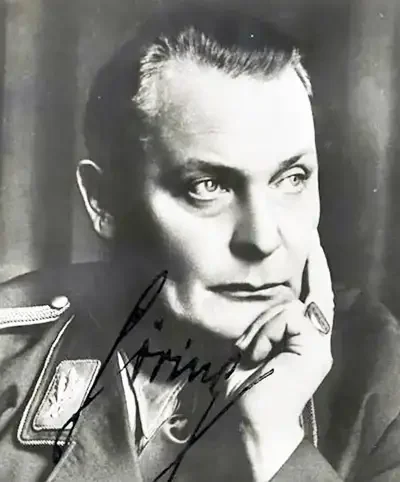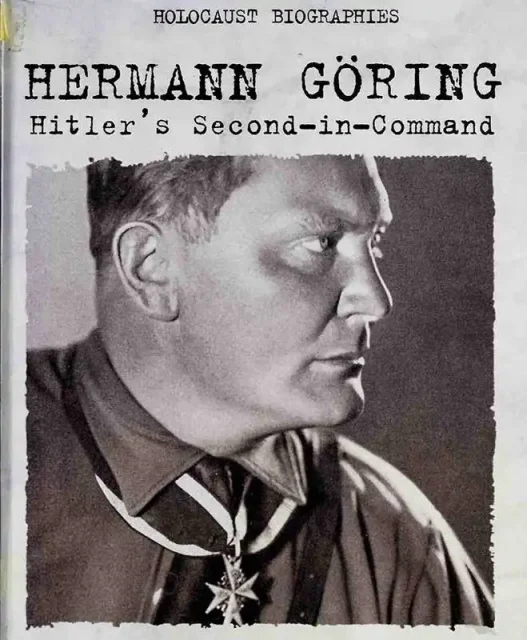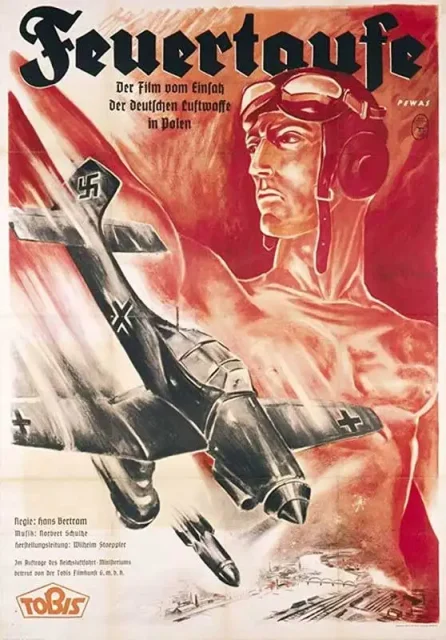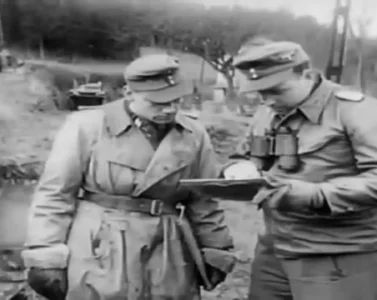- Military History
- Biographies
- Militarians Biographies
- Reichsmarschall Hermann Wilhelm Göring
Reichsmarschall Hermann Wilhelm Göring
German Reichsmarschall (Imperial Marshal) who was architect of the Nazi Luftwaffe (air force) in World War II
Hermann Göring's position as second only to Adolf Hitler in the establishment and maintenance of the Nazi regime is unquestionable, although his influence diminished after 1942. His close and jealous rivals were Joseph Goebbels and, in the later years of the war, Heinrich Himmler and Martin Bormann. But none received, as Göring did in 1939, when Hitler publicly acknowledged him as his "successor". Rudolf Hess, commonly called Hitler's deputy, was never more than his deputy at the head of the party as distinct from the state.
At the Nuremberg Trials after the war, Göring was inevitably the principal defendant and the self-appointed advocate for the regime. A man of exceptional ability and cunning intelligence he sought to be considered a political condottiere, even a gangster, whose only interest was the successful accretion of power by strong-arm methods. His arrogant ambition, his vanity and self-display (enlarged by his drug addiction), reached absurd proportions, but he did not mind exciting laughter, which he accepted as a sign of admiration.
His gravest weakness was his inability to keep an interest in anything that could not be achieved quickly. His wartime neglect of the Luftwaffe once it became strained beyond its resources led to his virtual retirement under the excuse of ill health during the last years of the war. He preferred to concentrate on his country estate, his hunting ventures and his largely pilfered art collection rather than on the day-to-day conduct of the war.
Hermann Göring's childhood and early years
Göring was born on the 12th of January 1893 in a hospital in Bavaria, to which his mother had been sent from Haiti where her husband, Heinrich Ernst Göring, was the German consul general. Franziska was his second wife (a woman of modest Bavarian origin) and Hermann was her fourth child. Father Heinrich Göring was near retirement and the family settled for a while in Berlin in 1896, living in impoverished circumstances. Franziska submitted readily to the protestations of a partly Jewish lover the wealthy Ritter von Epenstein, family doctor and a friend of long standing, who offered the Göring’s residence in one of his two castles in Bavaria (Veldenstein) near Nuremberg where Franziska lived discreetly as Epenstein's mistress.
The castle, with its ornate furnishings, provided Hermann, in his youth, with a consciousness of class. He was a bossy boy, difficult at school and spoiled. He loved rough games and mountaineering. They brought him up to regard his godfather, Epenstein, as a foster parent while his father capitulated to alcohol and old age. At 16, they sent Göring to the military training college at Lichterfelde (Kadetten Anstalt - Cadet Institution), near Berlin. Responding well to this form of education, he earned in 1912 (at age 19) a commission in the Infantry Regiment Prinz Wilhelm. The family's circumstances changed; Epenstein married and the Göring’s went to live in Munich, where Heinrich died in 1913. It is noteworthy that the connection with the Epenstein's was not entirely broken. In 1939, Epenstein's widow died and in her will, she left the castle of Mauterndorf to the Göring family.
Hermann Göring in World War I
Göring's World War I service was distinguished. Encouraged by a friend, Bruno Loerzer, he transferred to the embryonic Army Air Force. In 1915 he qualified as a pilot, flying fighters and becoming a well-known air ace. By 1917, he was commanding a squadron of fighters and he won the sought-after decoration “Pour le Mérite”. In July 1918, at the age of 25, he succeeded the legendary Manfred von Richthofen as commander of the Richthofen squadron. The following November, after the war was over, Göring was disgusted by the conditions of the armistice. He felt the Army had been dishonored. He was discharged with the rank of captain and left Germany for Denmark and eventually Sweden, taking up a career as a civilian pilot and acting as sales agent for the Heiniken parachute.
Göring and the beginning of nationalism in Germany
In Sweden, he fell in love with the Baroness Carin von Kantzow, who divorced her husband in order to be free to marry Göring. He returned to Germany to consolidate his business career. They married in Munich in February 1923, a few months after Göring had met Hitler and joined the Nazi Party.
Göring had fallen completely under the spell of Hitler's nationalism, while the former air ace was exactly the man Hitler felt he needed to take charge of the Sturmabteilung (SA) - Storm Troopers. "I gave him a wild crowd," said Hitler, "but in a brief time he had organized a division of 11,000 men". At 30, Göring stood second to Ernst Röhm (Hitler's “chief of staff”) aged 36 who had belonged to the party since its founding.
Göring’s participation in the Munich Putsch and time in exile
Röhm and Göring became Hitler's principal lieutenants in the unsuccessful Munich putsch of November 1923, in which Göring was badly wounded in the groin. His arrest was ordered by the Munich authorities, but he was taken across the border into Austria by his wife and sympathizers, including – significantly some of the police. Göring's neglected wound having turned gangrenous. They gave him morphine, to which he was to become a near lifelong addict. They kept him in a hospital in Innsbruck until Christmas. The Göring’s now dependent on financial help from sympathizers and moved to Italy when his notoriety as a Nazi made him persona non grata in Austria.
They were to remain in exile until 1927. In Italy, Göring studied art and on one occasion met Benito Mussolini. In May 1925, he and his wife went to Sweden to be near Carin's family (both by now were in poor health). Carin was a near invalid with a weak heart. Göring, hypochondriac and fat was certified as a dangerous substance misuser and confined in the Långbro Mental Institution in Sweden on the 1st of September 1925. They did not declare him cured until 1926.
Göring’s return to Germany and his rise in the "Nazi environment"
He returned to Germany alone when President Paul von Hindenburg proclaimed a political amnesty in autumn 1927. Göring returned not only to rejoin Hitler but to reestablish himself in the business world, especially in aviation. His wife joined him later.
Hitler was in no hurry to reemploy his former aide, though he foresaw his potential use as a contact man, especially among industrialists. Göring and his wife represented in his eye’s social "class". Hitler eventually accepted him as one of the party's candidates for the Reichstag in which he became a deputy in May 1928 representing Bavaria, along with another of Hitler's protégés, like Joseph Goebbels, who was now the party gauleiter of Berlin. Their instruction from Hitler was to disrupt and embarrass the Social Democrats and the government as much as possible.
Göring, enjoying his new status, became the "Salon Nazi", establishing confidence among the right-wing nationalists, upper-class industrialists and bankers such as Fritz Thyssen and Hjalmar Schacht, while Goebbels and the Nazi "radicals" gathered support among the working class and after the onset of the Great Depression the growing numbers of the unemployed.
Determined to seize power by strictly legal means, Hitler made the Reichstag his ultimate arena and Göring his principal representative. It was Göring who accompanied Hitler when he had to meet formally with President Hindenburg. After the election of July 1932, the second landslide in favor of the Nazis (who gained 230 seats) Göring was elected president of the Reichstag. Now he could boast a palace in his own right. His wife, Carin, was not there to share his glory. Worn out by the troubles of her married life and her illnesses, she had died in Stockholm the previous October.
Göring, as president of the Reichstag, had little respect for protocol as he even attempted to oust the Chancellor Franz von Papen from office by deliberately framing a vote of disapproval. Although the Nazis lost seats in the next election (November 1932), they reelected Göring president. After Hitler finally became Chancellor, Göring received a seat in his cabinet and was made a commissioner for aviation and minister of the interior in Prussia, by far the largest and most powerful of the German states (with its administration in Berlin alongside the federal administration).
He immediately set about re-staffing the Prussian police force by placing Nazi supporters in key positions and creating auxiliary police forces manned by SA and SS men. He remodeled the existing political police and renamed them the Geheime Staatspolizei (GESTAPO) and established Concentration Camps to deal with political dissidents. On the 27th of February 1933, the Reichstag fire occurred and, whether it was deliberately instigated by Göring, he took immediate advantage of it to arrest prominent Communists and even Social Democrats, including many Reichstag deputies.
The fire came only a few days before the next Reichstag election on the 5th of March in which the Nazis polled their final vote in what still passed as a free choice 17.27 million votes (43 percent of those cast). Even with arrests of their key opponents and intimidation of the rest, the Nazis could still not command an absolute majority in the Reichstag. With so many empty seats and with Göring as a scarcely impartial president, Hitler secured passage of the Enabling Act, which gave him the power to rule Germany by decree.
Although at this stage Göring was a dedicated worker, devoting time and energy to his many offices of state, he was not slow to feather his own nest. He had two official palaces: One as the president of the Reichstag and another as the minister of the interior for Prussia, also a luxurious apartment in the Kaiserdamm (a luxurious boulevard in the Westend and Charlottenburg districts of Berlin). His grandiose nature found full expression at the public expense, most of all in the magnificent country house Carinhall (dedicated to his late wife, whose remains were re-interred there in 1934). As Master of the German Hunt, he developed this mansion from an old hunting lodge on a vast 100,000-acre (404 square kilometer) estate in the forests north of Berlin.
Göring had no conscience where money or property was concerned. Now that he was in a position of supreme power, graft on a giant scale operated in his favor through his industrial contacts. He thought of himself as a Renaissance prince and his weight rose eventually to 280 pounds (140 kg). His clothes became notorious for their flamboyance and extravagance; uniforms, hunting costumes all expressed his arrogance, as did his splendid flashing rings. Jewels were an obsession with him. His self-satisfied good humor and occasional self-mockery excused much. His sociability, in contrast to the dourness of many Nazi headmen, made him relatively welcome in the social life of the diplomatic corps in Berlin. His birthday became the occasion for an opera ball and lavish gifts from all over the nation. He organized hunting parties on his estate, attended by ambassadors and diplomats from abroad.
Although always sentimentally loyal to the memory of his late wife, from 1932 he associated closely with a well-known actress, Emmy Sonnemann, a divorcee whom he married in an elaborate ceremony on the 10th of April in 1935. They were to be a devoted couple, and a daughter, Edda, their only child, was born in 1938.
Göring was to occupy during the 1930s a succession of offices besides those he already held. One, however, he relinquished was the control of the Prussian Gestapo and the concentration camps which he surrendered to Himmler in 1934. The same year, he played the leading part, along with Himmler, in the downfall of Röhm and the bloody purge called the “Night of the Long Knives”. His air commission became a ministry, covering the secret development of an air force that later was called the Luftwaffe. The German air arm was established in March 1935 and tours of service in the Spanish War gave Göring's pilots important battle training.
The road to war
Göring's ambition, however, went beyond this; he wanted to take possession of the entire economy of Germany, where it was directed toward a future war of expansion, and in September 1936 Hitler responded by making him National Commissioner for the Four-Year Plan for the German economy. Feeling succeeded by this move, Dr. Schacht (Hitler's Economics Minister and Supreme for War Economy) resigned in November 1937. Göring also aimed at becoming Hitler's travelling ambassador abroad; indeed, he became a constant visitor to Mussolini in Italy and played host at home to such visiting dignitaries as the Duke of Windsor, Lord Halifax, Charles Lindbergh and Sumner Welles.
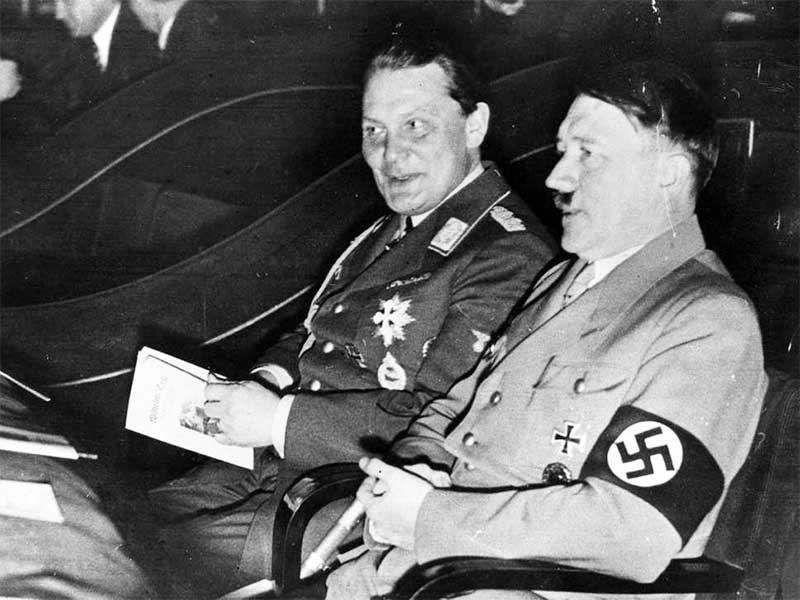
In 1939, Hitler finally declared Göring his "successor," thus making him the second man in Germany. There seemed no limit to Göring's ambition and his enthusiasm was, by now, conditioned by his resort to para-codeine (a mild derivative of morphine). He became a secret patient of Prof. Hubert Kahle, who had a sanatorium near Cologne and had devised a quick but only temporary therapy for withdrawal from certain drugs. Göring was forced to resort to this cure at intervals during the rest of his life, but his addiction was common gossip in Germany and was said to account for the extravagances in his behavior. He was finally to be taken completely off drugs by the Americans when in captivity in 1945 and awaiting trial.
With Röhm gone, Göring had ambitions to become (as Röhm had hoped to become before him) Minister of War and willingly joined in the devious plots of 1938 surrounding the downfall of Field Marshal Werner von Blomberg (War Minister and Commander-in-Chief of the Armed Forces) and of his successor, General Werner von Fritsch (Commander-in-Chief of the Army) who was falsely charged with homosexuality by the Gestapo. Göring failed in this ambition since Hitler took over both the ministry and the command of the Wehrmacht.
Göring presided over the court of honor which the Army insisted should examine the Gestapo's case against Fritsch, but since the final session coincided with the move into Austria in 1938 (Anschluss), Göring washed his hands of the business, knowing that Fritsch was already ruined. Göring himself conducted by telephone the final blackmail of Kurt von Schuschnigg (the Austrian Chancellor) and President Wilhelm Miklas on the night of the 11th of March 1938, which led to the downfall of Austria. German troops had been stationed along the border, ready to march the moment the signal was given.
Göring also figured in the persecution of the Jews, presiding over the notorious high-level conference following the pogrom of November 10, 1938. He regarded the destruction of property with disfavor: "I wish you had killed 200 Jews and not destroyed such properties", he grumbled. Göring, in fact, was worried about the hasty way in which Hitler was directing Germany's destiny toward war without adequate preparation.
He considered 1942 the first year in which Germany would be ready to wage a major war. It was for this reason only that he became an advocate during 1939 for the maintenance of peace. So long as Hitler gained his territories, such as Austria, the Sudetenland or Czechoslovakia as a whole, by hard-fisted negotiation or sheer blackmail, Göring was happy, and the thought of disrupting his luxurious life to enter upon the rigors of war went against his nature.
Poland, France and Russia on Hitler’s list…
When Poland appeared to be the territory upon which Britain and France would be prepared to make a stand, Göring came to be regarded as the moderate in the Nazi hierarchy, not only by the diplomatic corps in Berlin but by such interventionists as the Swedish entrepreneur Birger Dahlerus, who used his acquaintance with Göring to introduce him to an unofficial delegation of British business owners for a peace-promoting conference in August 1939. Dahlerus, who has left an account of his desperate, last-minute efforts to avert war in his book “The Last Attempt”, draws remarkable portraits of both Hitler and Göring. He was convinced of Göring's sincerity in these discussions, which lasted until after the start of hostilities.
"Leave it to my Luftwaffe", declared Göring as soon as the invasion of Poland was due to begin. Using the technique called Blitzkrieg, Göring's dive-bombers attacked Polish airfields, destroying hangars and fuel dumps. The Luftwaffe battered central Warsaw, leaving its buildings as empty shells. The Luftwaffe feature film "Feuertaufe" Baptism of Fire, introduced by Göring himself, boasted about the achievement after the short-lived campaign was over. Later, in 1940, the same merciless treatment was given to Rotterdam, where 800 people were killed. "Leave it to my Luftwaffe" was to be Göring's repeated delight.
Battle of Britain
In 1940, Göring had the largest air force in the world, with 3,500 operational aircraft. He was never again to be so powerful as now, when in July Hitler made him "Reichsmarschall des Grossdeutschen Reiches" (Reich Marshal of the Greater German Reich). But after the fall of France, Göring met his first setback in the failure of the Luftwaffe to give the Royal Air Force the "Coup de grâce". Both sides sustained heavy losses, but the Spitfires proved far too damaging during the key period of the Battle of Britain from mid-August 1940 on. Göring supervised operations personally (when not hunting or resting at Carinhall) from his luxurious train, on which he was accompanied by his valet, Robert Kropp, his doctor and his nurse.
Operation Barbarossa
Hitler, averse to conducting a sea operation with his depleted navy, abandoned the attempt to subdue Britain from the air and turned his attention to preparations for his principal campaign - Operation Barbarossa against Russia. The Luftwaffe in 1940-41 found its firepower inadequate. Hitler's intuitive strategy had always laid emphasis on bombers and fighter-bombers in his war of aggression rather than on fighters needed for defense. Göring found himself required to maintain the defense of Germany with an insufficient number of fighters. He had boasted that no enemy bomber would ever penetrate the Fatherland. "If they do, you can call me Meier," he had joked.
By the start of the Russian campaign, the Luftwaffe would be spread out along a 2,000-mile (3,220 km) series of fronts. It failed even to subdue the RAF in its defense of Malta. The RAF raided the German industrial centers during 1941 and the first of the massive 1,000-bomber raids came in May 1942.
Turning to new interests which promised dividends, Göring took energetic charge of plans for the spoliation of Russia. The Ukraine was to become the granary of Germany. "Many millions of people will be starved to death, if we take out of the country the things we need", wrote Göring in a directive of May 2, 1941. It was Göring who sent Reinhard Heydrich on the 31st of July 1941 the secret order, couched in obscure terms, concerning the "Final Solution" of the "Jewish problem". At the Nuremberg Trials, these documents were to be the most damning that Göring had to explain away under cross-examination. Sumner Welles, visiting Germany in March 1940, had found Göring "monstrous" in span, flushed and wearing an emerald ring an inch square. Count Ciano, observing him in November 1941 in Italy, thought him "bloated and overbearing" and still obsessed by his jewels. He was utterly heartless about the suffering of civilians in occupied territories.
The problems the Luftwaffe faced because of trying to live up to Hitler's and Göring's demands took a heavy toll on such well-known senior officers as Ernst Udet and Hans Jeschonnek (the chief of staff) committed suicide; Werner Mölders was killed in a plane crash. Adolf Josef Ferdinand Galland, commander of the Fighter Arm and unafraid of Göring, tried to force him to stand up to Hitler about the supply of fighters, but Göring only trembled before the Führer's opposition. In 1942, Albert Speer was appointed Minister for Armaments, finally bringing real capacity for organization into the sphere of war production, where Göring still held the now empty rank of Economic Supreme.
By the spring of 1944, Speer was delivering some 3,000 aircraft a month, but it was too late to affect the outcome of the war and fuel was becoming scarce. Göring's last boast on behalf of the Luftwaffe was that he would keep General Paulus supplied by air in Stalingrad during the desperate days of January 1943. But while German soldiers were dying from freezing and starvation before the final capitulation, Göring was holding his usual elaborate birthday celebrations in Berlin.
With the United States in the war, the bombing of Germany was redoubled after 1942 and Göring found it convenient to withdraw himself as far as Hitler would permit. Goebbels, Himmler and Bormann took his place in Hitler's esteem.
Under cover of ill health Göring avoided every duty he could, gave way further to his drug addiction (he was swallowing up to 100 para-codeine pills a day) and concentrated on his vast art collection (valued after the war at $150 million), made up of gifts from industry and municipalities, purchases using state funds and depredations from Jewish art collections. The collection was kept principally at Carinhall, but also in his palaces in Berlin and in his southern castle of Mauterndorf. Late in 1944, Göring and his staff were preoccupied with organizing the removal of the principal collection from Carinhall to the south. Trainloads of treasures and furniture were evacuated in the weeks prior to the end of the war, while Göring himself traveled south accompanied by a fleet of cars, after saying goodbye to an indifferent Hitler on the 20th of April 1945.
The "End" - Surrender, Trial & Death
Göring's egocentric but well-meant attempts to persuade Hitler to allow him to take over leadership in the Reich, radio-communicated to the bunker on April 23, cost him instant dismissal and house arrest by embarrassed SS men that night. Still regarding himself as Germany's supreme, Göring endeavored to surrender in style to the Americans on May 8, and after some entertaining (for which the U.S. Army commanders concerned were reprimanded by General Eisenhower), he was flown on May 21 to the prison center (Ashcan) reserved for important detainees in Mondorf, near Luxembourg. Göring's attempts to ingratiate himself with his captors and to treat with Eisenhower "man to man" completely failed. He accepted normal prison conditions with good grace and consented to be taken off drugs, which caused him some temporary suffering but cleared his mind for the ordeal of the Nuremberg trial that began the following October.
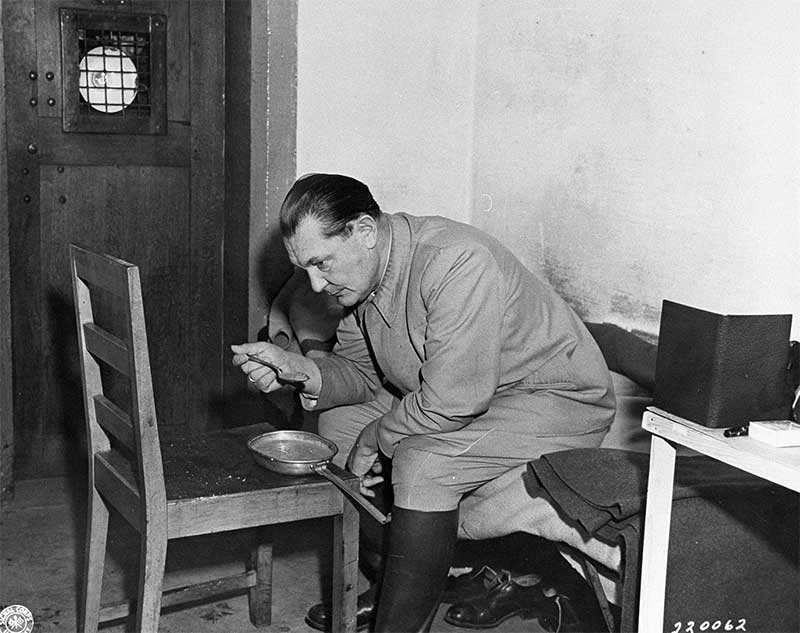
Göring was inevitably the principal defendant. He regarded himself as an advocate for the regime and conducted at great length as brilliant a defense as it was possible. But he was unable in the end to survive severe cross-examination. He knew all along that a death sentence was inevitable. When refused execution by shooting instead of hanging, he took his own life on the night of the 15th of October 1946 by using cyanide capsules he had successfully concealed throughout his captivity. He left a suicide letter for the American prison commandant, Colonel Andrus, which was only released for publication in September 1967.
Reichsmarschall Hermann Wilhelm Göring - Quick Facts
- German Empire (1866-1918)
- Germany - Weimar Republic (1919-33)
- Germany Nazi (1933-1945)
- Deutsche Luftstreitkräfte (Air Force German Empire 1910-1920)
- Gestapo - Geheime Staatspolizei (German Reich)
- Imperial German Army (1871-1919)
- Jagdgeschwader I (German Empire)
- Luftwaffe (German Reich 1933-1946)
- WWI (1914-1918)
- Weimar Republic (1918-1933)
- WWII (1939-1945)
- {{#owner}}
- {{#url}} {{#avatarSrc}}
{{name}} {{/url}} {{^url}} {{#avatar}} {{& avatar}} {{/avatar}} {{name}} {{/url}} - {{/owner}} {{#created}}
- {{created}} {{/created}}


